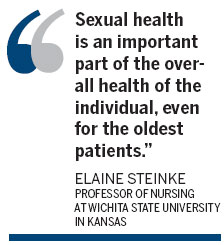Matters of the heart must not bar intimacy
Updated: 2013-07-31 07:23
By Lindsey Tanner in Chicago (China Daily)
|
||||||||
Many heart specialists are hardly Dr Ruth - sex is not something they relish bringing up with patients. But new guidance says they should, early and often, to let survivors know intimacy is often possible after a heart attack.
Discussions should involve everything from when and how to resume sex, to what position might be best for some conditions or not advised for others, according to a consensus statement released on Monday by the American Heart Association and the European Society of Cardiology.
It's billed as the first scientific statement with detailed guidance on resuming sex after a heart attack, stroke or other cardiac condition and is based on a review of medical literature.
"Sexual health is an important part of the overall health of the individual, even for the oldest patients," says Elaine Steinke, a researcher and professor of nursing at Wichita State University in Kansas. Steinke was the lead author of the statement.
Co-author Tiny Jaarsma, a professor and heart failure researcher at Sweden's Linkoping University, says doctors and nurses rarely discuss sex "spontaneously", but often wait until the patient brings up questions about sex. Health care providers often are afraid to upset patients or might feel embarrassed themselves.
Many heart patients can safely resume sexual intercourse after first checking with their doctors, and the answers to many questions depend on each patient's overall health, the guidance says.

Patients with mild, stable chest pain face a low risk for a sex-triggered heart problem, whereas patients with advanced heart failure should postpone sex until their condition is stabilized.
General precautions listed in the statement include:
Before resuming sex, make sure you can engage in moderate physical activity, such as walking briskly up two flights of stairs, without chest pain, breathlessness or other symptoms.
If moderate activity is too strenuous, avoid intercourse but not intimacy: hugging and kissing may be fine.
Have sex in a comfortable, familiar place and avoid things that could add stress to the experience, including extramarital affairs.
Tell your doctor about any symptoms during sex, including chest pain, dizziness or insomnia afterward.
Some positions may not be safe. Heart bypass surgery patients should avoid being on top in the missionary position, and Steinke says having sex in a more "upright position" may be easier for some heart failure patients, whose symptoms may include shortness of breath.
Ruth Westheimer, the famed 85-year-old sex therapist known as "Dr Ruth", commented on the study through her publicist from Switzerland, where she was hiking.
When hospitals have invited her to speak, she always gives the same message: "Doctors need to ask their patients about sexual functioning", even if both sides are embarrassed by the topic.
"When it comes to sex and heart issues, in my experience it's as likely to be the partner of the heart patient who is afraid of having sex," Westheimer says.
"What I suggest is that people write down their questions and send it to the doctor in advance of their appointment. That way they'll be sure the question gets asked and the doctor will have had time to get prepared to answer it."
Associated Press
(China Daily USA 07/31/2013 page9)
Most Viewed
Editor's Picks

|

|

|

|

|

|
Today's Top News
China-US talks yield 'incremental progress'
Spain investigators: Train driver was on phone
Apple faces more staff abuse charges
Spending surge for renewables
Beijing and Canberra to resume trade talks
Top leader vows to meet growth target
2,290 disciplined for extravagance
Japan diplomat seeks to mend ties
US Weekly

|

|















